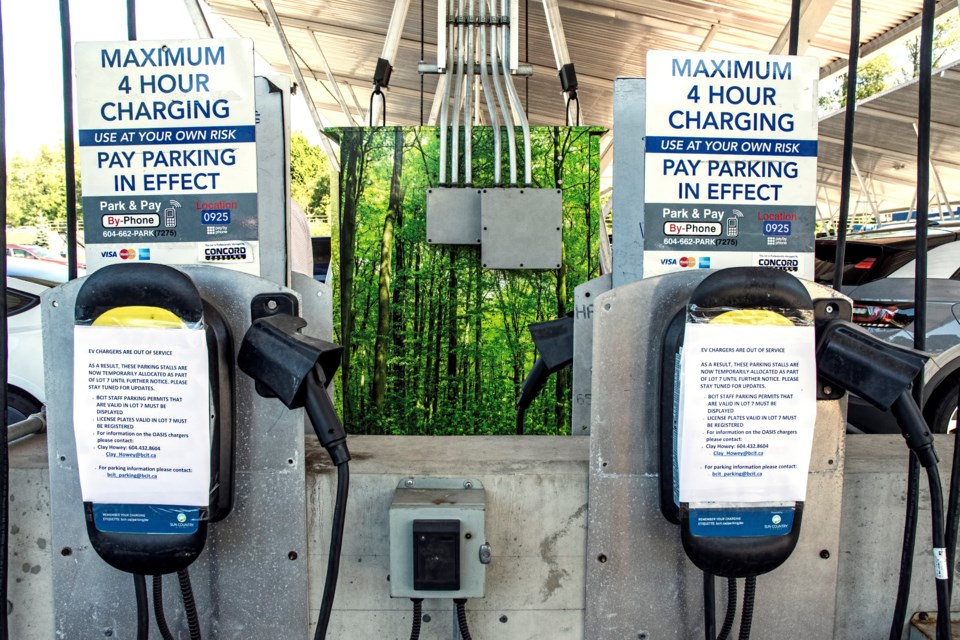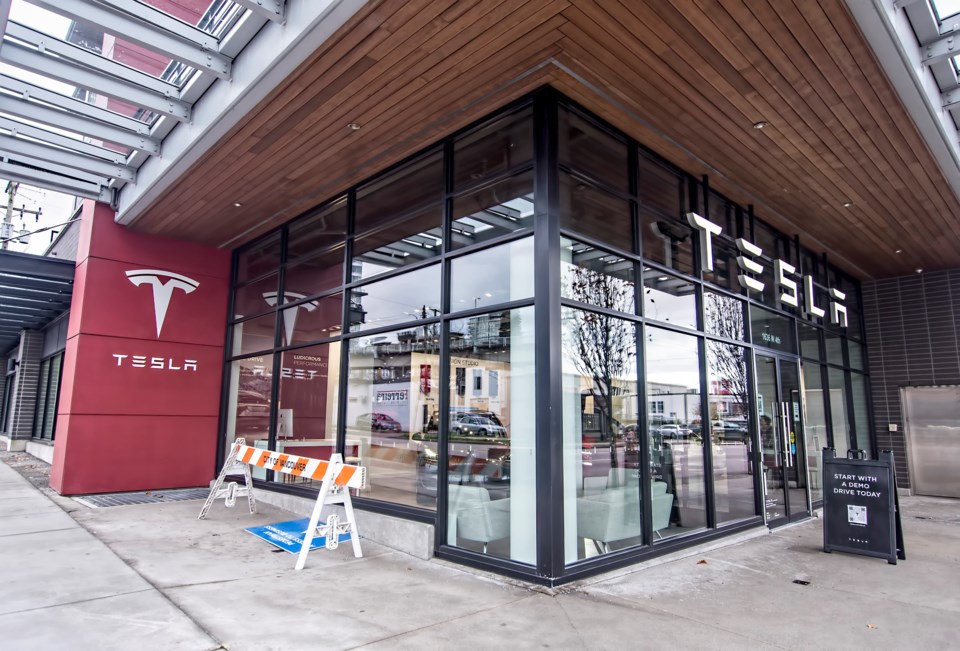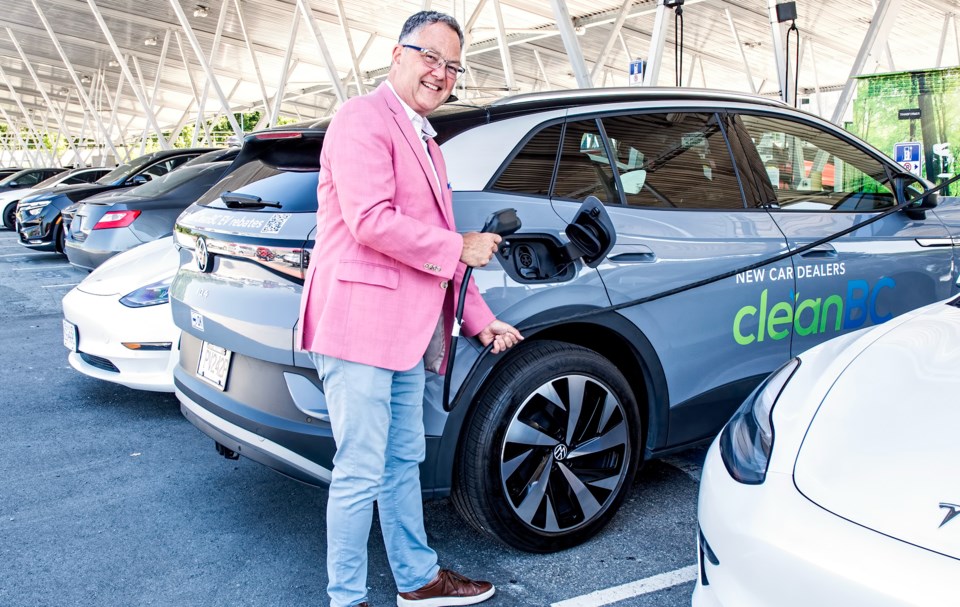As automakers increase production at their electric vehicle plants, consumers might expect to see prices come down.
After all, basic economics dictates that more production should mean lower prices if demand stays stable. Right?
Consumers should brace for this not being the case.
A mix of current and anticipated government policies at both the provincial and federal levels are to blame.
One initiative that has pushed many EVs’ end prices higher for consumers came from the B.C. government on June 18, when it reduced eligibility for its new-EV rebate program.
That program provides rebates up to $4,000 to B.C. consumers who buy qualifying new zero-emission vehicles (ZEVs).
The new system’s eligible rebates for new ZEVs in the regular car category are now only available for vehicles that have a retail price up to $50,000. That is down from the previous qualification level of $55,000, and therefore provides fewer rebates.
Another change to B.C.’s rebate program is that sport utility vehicles (SUVs), station wagons and vans are no longer in the larger vehicle category, which would have provided rebates to buyers on vehicles with retail prices up to $70,000. Those vehicles are now lumped into the category that only provides rebates for vehicles with prices up to $50,000.
“Changes will significantly impact the number of qualifying vehicles available within the threshold and as a result, push the purchase of a new ZEV out of reach for many British Columbians,” said New Car Dealers Association of British Columbia president and CEO Blair Qualey.
A second B.C. government initiative that is likely to prompt higher prices for EVs far into the future is its aggressive timeline with mandated targets for automakers to meet when selling automobiles in the province.
Failing to meet those targets would mean stiff fines for manufacturers.
Premier David Eby’s government last year brought in legislation to force automakers to meet escalating annual targets for the proportion of their overall vehicle sales and leases that are for light-duty ZEVs in the province.
The legislation puts into law Victoria’s aspiration to have 10 per cent of vehicle sales be EVs, or plug-in hybrids, by 2025, and 26 per cent by 2026.
The mandate then increases to 90 per cent by 2030 and 100 per cent by 2035.

Any automaker that does not meet those percentages for their own sales in the province by those designated years is set to face fines equal to more than $20,000 on each vehicle sold above that threshold, Qualey explained to BIV.
That fine is high enough that Qualey said he expects manufacturers to keep sales within those percentage thresholds.
Many drivers remain concerned that if they buy EVs, they will wind up stranded at some point and unable to charge their vehicles, or that their car battery will die sooner than expected and a require a small fortune to replace.
A June 29 J.D. Power survey found 66 per cent of Canadian respondents say they are “very unlikely” or “somewhat unlikely” to consider an EV the next time they have to buy a car.
If demand for EVs therefore lulls and does not surge to the same degree as the provincial targets, there would be a situation where automakers are forced to simply sell fewer total vehicles in B.C. so they do not get fined.
If fewer new vehicles are available for sale in the province and general vehicle demand remains steady, prices could be expected to rise.
A third reason why prices for EVs may rise—or at least stay above the cost of a conventional gas-powered vehicle—is that the Canadian government is likely to follow national allies such as the U.S. and the European Union and slap tariffs on Chinese-made EV imports.
That would stymie competition from Chinese automakers and protect less-competitive and more-costly North American-made EVs.
Canadian Finance Minister Chrystia Freeland in June told a media scrum that her government is considering whether to levy the duties because of what she called China’s “state-directed policy of overcapacity.”
This came after calls from premiers, including Ontario’s Doug Ford, to match the U.S. government’s move in May to quadruple tariffs on Chinese EVs, making them more than 100 per cent of the retail price. The European Commission, the executive body of the EU, in June proposed a 38-per-cent tariff on Chinese EVs on top of its existing 10-per-cent tariff.
Canadian tariffs on Chinese EVs are only 6.1 per cent.

Ottawa on July 2 launched a 30-day public consultation period on how Canada should respond to China’s vigorous EV production.
“Chinese producers are quite intentionally generating a global oversupply that undermines EV producers around the world, including here in Canada,” Freeland said.
Consumer advocates are mixed on the move.
Joanna Kyriazis, director of public affairs at Clean Energy Canada, said Freeland should also consider how tariffs would raise prices for consumers.
Any tariffs on EVs made in China would have “potential ramifications” for car buyers, she said.
“The federal government must navigate a tricky situation carefully, looking out for not only the auto industry’s interests—but Canadians enduring an affordability and climate crisis,” Kyriazis said.
The U.S. tariffs are not only on finished EVs but also on lithium-ion EV batteries and battery components such as natural graphite and permanent magnets.
If Canada failed to match the tariff rates that the U.S. slapped on Chinese EVs, EV batteries and components, there would be a risk that Canada would be seen to be a back door, through which Chinese EVs and components could pass on their way to the U.S.
That in turn could prompt the U.S. to retaliate against Canada.
The tariffs on various battery parts, meanwhile, increase costs for any automaker that buys those components.
More incentives needed to fuel used-EV sales
B.C. needs to step up with incentives for consumers to buy used EVs, some opposition critics say.
The B.C. government in 2022 stopped charging provincial sales tax (PST) on used EVs that were driven more than 6,000 kilometres, but that tax-free status is set to end in February 2027.
The PST rate is then set to revert to being 12 per cent for vehicles sold at prices up to $124,999, 15 per cent on transactions for vehicles priced at between $125,000 and $149,999, and 20 per cent for vehicles priced at more than $150,000.
Even the current tax-exempt status for used EVs is not enough for advocates such as BC Greens leader Sonia Furstenau.
She would like to see B.C.’s rebate program on new EVs extend to a much larger range of vehicles.
She told BIV that her approach is to look at the desired effect of government action and then work backwards to see what policies governments should put in place to achieve the goal.
The point of having consumers switch to owning EVs, instead of gas-guzzling ones, is to reduce fossil fuel use and harmful greenhouse-gas emissions that eat the ozone layer and accelerate climate change.
Having more rebates would make buying an EV more viable for many more people, and therefore help to achieve that goal, she said.
“We should extend [rebates] to not just retrofitted vehicles, but if we really want to encourage purchases, we could have a rebate program for used vehicles,” she said.
Furstenau added that if her party wins government in October it would dramatically increase funding for public transit, with $1 billion in new money – largely to increase bus service outside major metropolitan centres.





